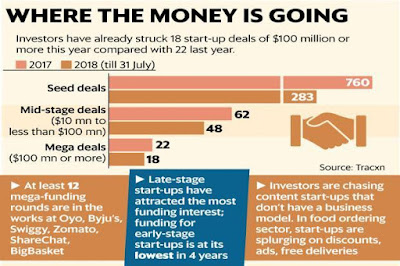Six Reasons Why Startups on Blockchain is the Next Big Thing
August 22, 2018Looking for an industry with an untapped potential on blockchain? It might be closer than you think.
Helping startups grow is a large global market. It is called crowdfunding: entrepreneurs raise funds by pre-selling their future product. If the idea is cool and resonates with the public, the authors collect enough funds to launch the product. However, it is still severely under served and is confined by embarrassing & archaic restrictions.
A crowdfunding platform that kicked off back in 2012, Boomstarter.Network is now aiming to disrupt this market with blockchain technology, cryptocurrencies, and even mining tools. Boomstarter has already garnered investment from a hedge fund that earlier bought Telegram and Dropbox. The fintech team is leveraging the emerging technology to break the geographical limits and remove intermediaries.
We’ve put together important data points to explore how this bold plan just might work and gain value for startups and investors alike. Let’s roll!
Size of crowdfunding market is huge
There are millions of current and potential entrepreneurs in the world willing to make their dreams true by validating their idea through pre-sale. If the product is great, the pre-sale will bring funds to develop the product. The current total volume of crowdfunding exceeds 6.5 billion dollars.
Global crowdfunding is ripe for disruption
Crowdfunding was growing rapidly: in 2017 it increased by 49% globally. However, projections for the following years show a steady slowdown. Obviously, the expected decline is due to a number of limiting factors. The demand from startups cannot be satisfied with the traditional platforms which are infamous for geographical restrictions and slow transactions.
Erasing geographical limits will skyrocket market growth
Existing crowdfunding platforms are estimated to be serving a mere one-third of the world’s startups. One of the busiest platforms, Kickstarter, only allows entrepreneurs from 22 industrialized countries. With cryptocurrencies, crowdfunding will be effective, quick and borderless. This will surge demand and participation by startups from all over the world.
Removing intermediaries will help startups thrive
A dreaded meltdown factor of the existing crowdfunding world is waiting time for startups to receive the money from their backers. Startups wait for weeks and often cannot get the funds in time to begin developing their product according to their plan. It happens over and over again because the current system is overly dependent on third parties like banks or payment systems.
Using blockchain, smart contracts and crypto act as a medium for startups and backers to interact will reduce transaction time to minutes and guarantee payments with no intermediaries involved.
Crypto-mining as a tool driving engagement
While introducing an all-crypto platform, Boomstarter.Network says it has a plan for those who are not yet into digital currencies. The fintech company claims to offer tools to contribute cryptocurrencies to the projects by interested sponsors. The idea is to unite supporters of a given startup in a cloud-mining pool so that the amount of crypto they generate all together becomes substantial.
This is a pioneering non-material way to support startups, solving the common issue when people don’t buy, but only repost a startup’s offer on their social media. For startups, it is an interesting tool for building an active and motivated community.
Good competition to disrupt the market with blockchain
There are other teams out there that aim to address the grievances of this expanding market. However, none of them have shown an integrated solution which also takes care of the vast audiences that have not yet embraced crypto.
With this in mind, Boomstarter.Network seems uniquely positioned to garner a big share of the global market just waiting to be disrupted. The company’s token, designed to be used as a means of payment on the platform, performs as a practical representation of value. It will be deployed to build real businesses that serve real purposes.
By providing universally accessible tools to help startups grow wherever they are, it is possible to boost demand and traction for wider adoption. This will bring positive movement to the token’s price, drawing in more entrepreneurs, supporters, and investors.
Source: https://ambcrypto.com/six-reasons-why-startups-on-blockchain-is-the-next-big-thing/







